|
|
|
Horace Brown
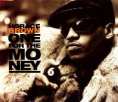 Horace Brown is
an indefatigable man. During his two day long P.R. visit to Stockholm in April, his
intense schedule included giving numerous interviews, a live TV performance from
Gilbey’s Dance Music Awards -96 (in front of an audience consisting of a virtual
who’s who in the Swedish dance-music industry ) and to top it off some
heavy-duty-all-night partying after the show. Consequently, he hadn’t slept much and
was in addition hungry like a wolf when it finally was my turn to interview him. The time
was almost five thirty in the afternoon, he’d talked to journalists all day and had
not even eaten! Who said being an artist is an easy job? Horace Brown is
an indefatigable man. During his two day long P.R. visit to Stockholm in April, his
intense schedule included giving numerous interviews, a live TV performance from
Gilbey’s Dance Music Awards -96 (in front of an audience consisting of a virtual
who’s who in the Swedish dance-music industry ) and to top it off some
heavy-duty-all-night partying after the show. Consequently, he hadn’t slept much and
was in addition hungry like a wolf when it finally was my turn to interview him. The time
was almost five thirty in the afternoon, he’d talked to journalists all day and had
not even eaten! Who said being an artist is an easy job?
 Despite
all this, Horace was enthusiastic, spontaneous and funny. Despite
all this, Horace was enthusiastic, spontaneous and funny.
-I love this place! It’s so different! So clean and nice! What an experience! he
exclaimed. I asked what specific Swedish things he had liked the most and his response,
"The women!" came instantly. In fact, the very thought of the Swedish honeys he
had met the night before, triggered him to perform a series of smacking noises as he
kissed an imaginary woman, before letting out a delightful moan: "Aww, I wish I could
take ‘em all home." Referring to the myth that all Swedish women have fair hair
I insinuated that perhaps Mr. Brown had a weakness for blondes. Horace giggled while
announcing:
-No, girl! I got this thing for beautiful women! It don’t matter, their hair could be
blue and they’d still be beautiful!
Charlotte, North Carolina-born (now a
resident of Staten Island, New York) Horace Brown doesn’t like talking about his age,
("I’m twenty something") but was only happy to share how being the son of a
minister naturally exposed him to gospel music from an early age and how come he’s a
musical omnivore.
-Well, my big brother introduced me to all types and styles of music from Steely Dan to
Sting, from The Gap Band to Genesis, Bobby Caldwell, Level 42, Stevie Wonder... I was
listening to things that friends of mine weren’t into but I didn’t sing at the
time, I just loved music. I played baritone sax and trombone in the marching band in high
school, but my main interest was basketball. I didn’t focus on singing until I
suffered a critical knee injury.
His tone of voice changed as he talked about his beloved brother.
-He died three years ago and I miss him dearly. I wish he was around to see what his
little brother has accomplished. That’s the only thing I regret. I wish he was here.
He was my brother and I always looked up to him, always wanted to make him proud. And he
didn’t get to see the world, you know? I feel like I carry him everywhere I go, so
he’ll get to see it through my eyes.
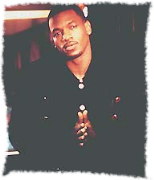 After
seeing and hearing Horace live (no playback, he sang for real) I found it hard to believe
that he hadn’t honed his vocal skills for more than a few years, as his press bio
suggested. After
seeing and hearing Horace live (no playback, he sang for real) I found it hard to believe
that he hadn’t honed his vocal skills for more than a few years, as his press bio
suggested.
-It’s the truth. I never sang and never thought I would.. It was a gift and I
realized, in fact a lot of people made merealize, that I could sing. Like I said, I was
into basketball and when me and my friends were driving home from the courts I used to
sing along to my favorite songs on the radio and they always said I sounded like Aaron
Hall . Anyway, six or seven years ago, that’s when I began putting demos together.
About for years ago, DeVante Swing (of Jodeci), who happens to be from my hometown, got a
hold of one of my demo tapes and he liked what he was hearing. He was like "yo man
you’re dope!". This was before Jodeci’s first album came out. Whenever
DeVante was in town he called me and we got together. Anyway, eventually he flew me out to
L.A. where I did background vocals and co-wrote "All I See" with DeVante for
Christopher Williams. I was just so excited. There I was, working in the studio with this
guy that my women used to scream over. And Cristopher even liked my voice enough to ask
for a copy of the reference track where I sang lead. I was trying really hard to keep my
cool, though!
Horace smiles at the memory.
-Andre Harrell (then president of his own Uptown label, launched in 1986, introducing
hip-hop soul to the world with artists like Mary J. Blige, Heavy D and Jodeci) was there
as well and he wanted a copy of the reference tape too. Fact is, I didn’t even know
who he was at the time, I just thought he was some A&R person. Andre told me
repeatedly to come see him whenever I would go to New York. And I did. We became friends
and he signed me with the Uptown label.
Those with a good memory may recall
reading about Horace in the April '95 issue of Vibe Magazine. So whatever happened with
the album mentioned in that article?
-It was never released. All that came out was the single "Taste Your Love". The
album was supposed to come out, but it never dropped. Vibe heard some of the songs from
the album so that’s how they could write about them. Things happened and Andre was
making his move to Motown (where he now is president and CEO) and he took me with him. It
gave me confidence that he really did believe in me, because I had been signed with Uptown
for like three years and was always put on the shelf, Horace explained without sounding
bitter. As he continued to talk about what must have been a poised situation, it became
apparent that the delay probably had been planned from the beginning by Andre Harrell.
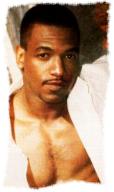 -I learned so much from being around such great talented
performers like Jodeci and Mary (J. Blige). I watched them go on stage during those years
on Uptown and I think that’s where I got a lot of experience. Andre’s very
smart. He wants you to have that experience. He will take you through the channels, so
that you find yourself, the artist that you are, before you get out there. -I learned so much from being around such great talented
performers like Jodeci and Mary (J. Blige). I watched them go on stage during those years
on Uptown and I think that’s where I got a lot of experience. Andre’s very
smart. He wants you to have that experience. He will take you through the channels, so
that you find yourself, the artist that you are, before you get out there.
Vibe described the single "Taste
Your Love" as "a soft-porn salute to the simple, oral pleasures of life"
and "makes 'Sexual Healing' sound like a nursery rhyme".
-Yes, I am nasty! I admit it! I love women and I feel like if you’re with somebody
that you care about that way and that’s love then you should get everything you want
from your man. You shouldn’t have to go anywhere else to get anything. I mean, if you
were with me, we’d be doing everything we could think of. I wanna be your fantasy,
you know? It makes better relations. There shouldn’t be no shame, no fear and you
must be able to be very open with your partner and be allowed to be yourself.
Horace the Lover left, enter Horace the Comedian who pretended to be insulted when I
pointed out that some of the lines in the song wasn't what one might expect from the son
of a preacher man.
-You know very well that I come from a respectable family! I didn’t go overboard. I
think it was tasteful and I definitely meant good things by it. I can’t help myself
‘cause I’m a Scorpio so I got that sexual vibe in me. But I wasn’t thinking
about radio when I wrote it!
As could have been expected, the juicy
"Taste Your Love" was banned in the Bible Belt. (For those who missed it the
first time around, it's included on Horace's debut album, released in June 1996). And now
the man behind it is eager to prove that he isn’t all about bumpin’ and
grindin’.
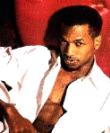 -No, no. I write songs about how I feel about things that happen in life, he
stresses. -"Taste Your Love" isn’t a total picture of me. People who listen
to the whole album will see that there are other sides to my personality, not just the
sexual. -No, no. I write songs about how I feel about things that happen in life, he
stresses. -"Taste Your Love" isn’t a total picture of me. People who listen
to the whole album will see that there are other sides to my personality, not just the
sexual.
Because of the combination of his
father being a minister and the sexy image, the before-mentioned magazine named him
"the Marvin Gaye of the nineties". It sounded like Horace didn’t feel quite
comfortable with that epithet.
-Well, people are gonna say all kinds of things and I don’t take it to heart. I mean,
I take them as compliments and then I move on. Maybe later when they know more about me
they will find other names or whatever. I just wanna continue to give my best and be
myself.
Marvin never did feel quite comfortable playing the role of the sex symbol I hinted,
assuming Horace wouldn’t mind being in that position. To my surprise he didn’t
seem to like the idea. "I don’t know.. I haven’t thought about me like
that", was all he said. What he did agree to sharing with Marvin was stagefright.
-Oh, yeah, but I think everyone does. I’m still nervous about touring and performing
in front of all those people. Who’s gonna accept me and who’s not.. I care about
bad reviews, but I’m my own worst critic. I give myself a hard time. I love what I do
and I wanna do what I do so I strive to get better, do better because I don’t wanna
miss out and I work hard. I’ll do whatever it takes. Being an artist takes a lot out
of you. There’s so much demand and time is not yours anymore. You really belong to
the audience and to the label, so there isn’t very much time left for yourself. But
all’n all I wouldn’t trade it for the world. This is something I have to do. I
wanted to find my place and I did. This is what I was supposed to do in my life and I
thank God for blessing me.
The first single lifted from Horace's
self-titled debut album is entitled "One For The Money" and in it Horace sings
about the reasons artists do what they do. The first verse goes:
"I remember in the day mama had to
work so hard, just to pay the rent, all the money spent, have to get another job. But now
we’re living in a eight room mansion on the hill and we’re sipping on champagne
when we chill. And we’re riding the Lex Coups, Bimaz and the Benz, all over the
world, from the east to the west coast, we’re making ends".
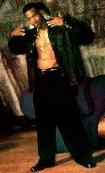 I asked whether
he lived the life of luxury yet. I asked whether
he lived the life of luxury yet.
-Nah, It’s just a fun song. I didn’t intend for it to be taken so seriously, but
I believe those are the goals of most artists, was Horace’s comment. But as he
continued, it became clear that it had a deeper message after all.
-We do it for the money, for the show (the energy you get from performing) and for getting
the honeys. These are certain things that you dream of when you’re growing up in
ghettos, in different pressures of life. I grew up in the ghetto, but my family always
took good care of us, I mean, we lived in the ghetto but we didn't strive to stay there
for the rest of our lives. It’s sad, but there are a lot of people that aren’t
gonna come out of the ghetto or out of the ghetto state of mind. They’re just gonna
stay there and be content and I don’t get that because there’s so much more that
life has to offer. Places to see, things to do.. Life is what you make it. Life is short
and I want to make all my dreams come true, that’s what the song is about. You want
those things not just so much for yourself, but for your family who’ve suffered for
so long.
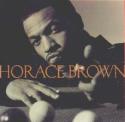 Talking about the people involved with the album: Talking about the people involved with the album:
-I work with producers like Dave "Jam" Hall (Mary J. Blige), Kevin Deane (who
produced the single "One For The Money") and Big Bub (a.k.a. Frederick Lee
Drakeford from the group Today. Anyone remember "Him or Me"?). Bub did two songs
for me. And I worked with Sean "Puffy" Combs (Notorious B.I.G., Craig Mack,
Total) in his Trinidad studio. The whole album isn’t finished yet, but I will most
likely be doing one more song, a duet with Faith Evans, produced by "Puffy" as
well. And one of Teddy Riley’s protégés, Rodney Jerkins, did a track for me.. I
don’t know if it will eventually end up on the album or not at this point.
Furthermore I did some producing myself with Chad Elliot (Total). We did "Why Why
Why" together, which is also the title of the album.. I wrote most of the material,
wrote all of the lyrics. (Note: The album was re-named simply "Horace Brown"
when released in June 1996. The Faith Evans duet, which Horace mentions above, is entitled
"How Can We Stop" and is included on the album. Additional producers and
songwriters on the CD include "Eddie F" Ferrell, The Characters (Troy
Taylor & Charles Farrar) and DeVante Swing. The Rodney Jerkins material (an uptempo
number entitled "Nuttin' But A Party") does not appear at all on the set,
neither does the Redhead Kingpin songs. "Gotta Find A Way" is one of the few
tracks, intended for release on the Uptown debut in 1995, that can be found on Horace's
long-awaited Motown album.)
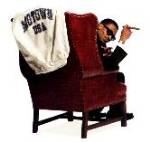 Moving into songwriting is a
conscious step on Horace’s behalf. Even though he claims to love being an artist, he
knows all too well that his days in the spotlight may be numbered. Moving into songwriting is a
conscious step on Horace’s behalf. Even though he claims to love being an artist, he
knows all too well that his days in the spotlight may be numbered.
-Yeah, I don’t think I’m gonna be the kind of artist that makes album after
album. So I’ve begun, in fact, I’m already writing for other artists out there
now. Me and a woman named Felicia Jefferson did "Now That I’ve Lost You"
for Silk on their new album, I’ve worked with Terri & Monica and I’m writing
for Jason Weaver. He’s coming out on Motown, and I’m supposed to go into the
studio with The Whitehead Brothers as well. It’s fun, I’m having a ball. A lot
of other artists who are not on the (Motown) label are giving me phonecalls and asking me
to write or sing or produce a song with them. You’re gonna hear a lot about my
writing and producing.
So how does it sound?
-Well, I hope it will be the kind of album that you want to listen to from beginning to
end and wanna play over and over. I hope the listeners will really feel the songs I’m
singing. |

 Horace Brown is
an indefatigable man. During his two day long P.R. visit to Stockholm in April, his
intense schedule included giving numerous interviews, a live TV performance from
Gilbey’s Dance Music Awards -96 (in front of an audience consisting of a virtual
who’s who in the Swedish dance-music industry ) and to top it off some
heavy-duty-all-night partying after the show. Consequently, he hadn’t slept much and
was in addition hungry like a wolf when it finally was my turn to interview him. The time
was almost five thirty in the afternoon, he’d talked to journalists all day and had
not even eaten! Who said being an artist is an easy job?
Horace Brown is
an indefatigable man. During his two day long P.R. visit to Stockholm in April, his
intense schedule included giving numerous interviews, a live TV performance from
Gilbey’s Dance Music Awards -96 (in front of an audience consisting of a virtual
who’s who in the Swedish dance-music industry ) and to top it off some
heavy-duty-all-night partying after the show. Consequently, he hadn’t slept much and
was in addition hungry like a wolf when it finally was my turn to interview him. The time
was almost five thirty in the afternoon, he’d talked to journalists all day and had
not even eaten! Who said being an artist is an easy job?  Despite
all this, Horace was enthusiastic, spontaneous and funny.
Despite
all this, Horace was enthusiastic, spontaneous and funny. After
seeing and hearing Horace live (no playback, he sang for real) I found it hard to believe
that he hadn’t honed his vocal skills for more than a few years, as his press bio
suggested.
After
seeing and hearing Horace live (no playback, he sang for real) I found it hard to believe
that he hadn’t honed his vocal skills for more than a few years, as his press bio
suggested. -I learned so much from being around such great talented
performers like Jodeci and Mary (J. Blige). I watched them go on stage during those years
on Uptown and I think that’s where I got a lot of experience. Andre’s very
smart. He wants you to have that experience. He will take you through the channels, so
that you find yourself, the artist that you are, before you get out there.
-I learned so much from being around such great talented
performers like Jodeci and Mary (J. Blige). I watched them go on stage during those years
on Uptown and I think that’s where I got a lot of experience. Andre’s very
smart. He wants you to have that experience. He will take you through the channels, so
that you find yourself, the artist that you are, before you get out there.  -No, no. I write songs about how I feel about things that happen in life, he
stresses. -"Taste Your Love" isn’t a total picture of me. People who listen
to the whole album will see that there are other sides to my personality, not just the
sexual.
-No, no. I write songs about how I feel about things that happen in life, he
stresses. -"Taste Your Love" isn’t a total picture of me. People who listen
to the whole album will see that there are other sides to my personality, not just the
sexual.  I asked whether
he lived the life of luxury yet.
I asked whether
he lived the life of luxury yet. Talking about the people involved with the album:
Talking about the people involved with the album:  Moving into songwriting is a
conscious step on Horace’s behalf. Even though he claims to love being an artist, he
knows all too well that his days in the spotlight may be numbered.
Moving into songwriting is a
conscious step on Horace’s behalf. Even though he claims to love being an artist, he
knows all too well that his days in the spotlight may be numbered.  Horace produced, sang
the chorus and played keyboards on the outstanding "Can't Get Enough", a track
taken from singer/songwriter/keyboardist George Cole's 1997 album "Behold The
Man" (Universal UMD-87085).
Horace produced, sang
the chorus and played keyboards on the outstanding "Can't Get Enough", a track
taken from singer/songwriter/keyboardist George Cole's 1997 album "Behold The
Man" (Universal UMD-87085).